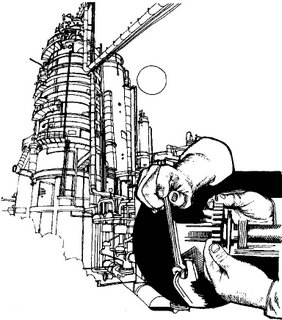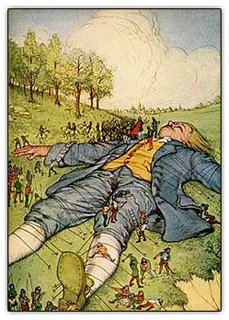 An interesting post that was published in Alberta Views magazine and is now online, comparing Alberta and Venezuela. This was written prior to Ralph Klein stepping down on Thursday, finally.
An interesting post that was published in Alberta Views magazine and is now online, comparing Alberta and Venezuela. This was written prior to Ralph Klein stepping down on Thursday, finally.
Interesting how the U.S. media refers to Chavez as a dictator but they never refered to Klein that way, though in Venezeula there is actually more opposition in government than there is in Alberta.
Now this is the challenge facing our new President of the Executive Council of Alberta, Ed Stelmach. Bet you didn't know that Alberta had a President. Yep that's the Premiers official designation. CEO of Alberta Inc.
This aritcle reminds me of the Parkland Institutes reccomendations for a new energy policy for Alberta A Made In Alberta Canada First Energy Policy
Auctioning Canada’s Future Under the Klein Government
While Venezuela has taken advantage of record oil prices to invest heavily in social spending, Alberta’s Klein government has moved steadily in the opposite direction. Private companies investing in Alberta’s tar sands pay just 1 per cent royalties until all capital costs are paid off. Because of incentives from the provincial and federal governments, corporate taxes are low on tar sands projects and declining in the oil and gas sector as a whole.
Nonetheless, Alberta government revenues have increased in tandem with rising global prices—from just $2.6-billion in 1998 to a whopping $9.74-billion in 2004-05. Yet this money has been spent largely on maintaining the country’s lowest income tax rate and paying off the deficit. Despite the oil-fuelled economic boom, Alberta continues to have the lowest minimum wage in the country. While social spending has increased slightly in recent years, it has not yet been restored to the levels it achieved before 1993, when the government cut social spending by 30–40 per cent.
Despite this enormous surplus, the Alberta government has pushed for an expansion of public-private partnerships in the health care sector. Critics argue that this is just a code word for privatization and that it violates the Canada Health Act. According to a recent report by the Edmonton-based Parkland Institute, the affordability of public health care is not at issue—the government has more than enough money from recent oil and gas windfalls. Rather, the report argues, funding social programs is contrary to the Klein government’s market-obsessed ideology.
Strategic Skeptics
Of course, there are those who argue that Alberta’s oil policy is preferable to Venezuela’s. They raise two main criticisms of the emerging Venezuelan model. The first is the fear that PDVSA’s newfound assertiveness will scare away foreign investment. “If competitive rules aren’t in place,” warns James Williams of WTRG Energy Economics, “they won’t be able to develop the heavy oil—unless Chávez does it himself. Foreign investors won’t be there.” British Petroleum (BP) CEO John Browne recently mused to an interviewer, “One has to question whether Venezuela wishes foreign oil companies really to be there in any big way.”
But the next day, not wanting to compromise his company’s substantial investments in Venezuela, Chevron’s Latin America director Ali Moshiri noted, “The name of our company is Chevron, and our Chairman is David O’Reilly. We have a different view [than BP] on Venezuela.” The fact is that despite raising the cost of investment for foreign companies, big oil remains in Venezuela—and, with prices surging, it’s not going anywhere.
The second critique is that Venezuela’s excessive social spending will doom the industry by ignoring crucial reinvestment. In late 2004, the IMF called on oil-producing countries to save profits from high oil prices rather than spend them. Oil industry analysts in the US make the same argument: Jenalio Moreno warns, “Windfalls from higher oil prices are enabling nations such as Ecuador, Mexico and Venezuela to mask the mounting urgency for reforms and investments needed in the region's energy sector.” Moreno cites Ricardo Amorim, head of Latin America research for WestLB in New York City: “One of the effects that you have when you have high oil prices is you can temporarily solve structural problems. Those countries are not investing as much as they should in the future and that could create bottlenecks.” Funding social programs with high oil rents is all well and good, say these analysts, but if maintenance of industry infrastructure (wells, pumps, roads) isn’t kept up, these oil-funded programs will be unsustainable.
But, according to the Venezuelan government, the future is precisely what Venezuela is investing in. In the same year that PDVSA invested US$3.7-billion in social programs, it reinvested almost twice that amount back into the company. The conflict at root of the “re-nationalization” process occurring under the Chávez government is between the “old PDVSA”—a profitable multinational that gave highly generous terms to private companies but transferred little profit back to the Venezuelan government—and the “new PDVSA,” managed efficiently and professionally in the interests of Venezuelan citizens.
Bolívar North?
A better deal for Alberta depends on the involvement of the rest of the country. This can come about only as the result of a collective decision by citizens to force it onto both provincial and federal agendas. But nationalist politics are probably not enough.
Canada has been riven by conflict over Alberta’s oil wealth for decades. During the days of the National Energy Program, Alberta fumed as the rest of Canada ate up their profits during boom-time. Since the death of the NEP, and despite relatively small surpluses in a few other provinces, the rest of Canada has come to resent what they perceive to be Alberta’s greed in hoarding a national patrimony as a provincial right.
This tension is, perhaps, less potentially divisive than it first appears. When we consider the potential rents that the provincial and federal governments are handing out in incentives to private companies, it becomes clear that there is enough money to go around—it’s just kept to a very small circle. A higher proportion of windfall profits would permit Alberta to reinvigorate and expand the Alberta Heritage Fund (a rainy day fund to protect Albertans in case of future price drops, the fund has been stagnant since the 1980s), bring funding for social-programs at least up to pre-1993 levels, begin serious restoration and mitigation of ecological damage resulting from oil extraction, and share a significant amount of money with its poorer brethren in the rest of Canada. As we have seen with Venezuela, the claim is preposterous that big oil would no longer find the tar sands profitable with royalties at such a rate. Oil-producing countries have the upper hand.
Alberta is not just missing out on the windfall profits currently enjoyed by private companies; it is squandering Canada’s reimbursement for the exhaustion of a non-renewable resource. The extraction of tar sands and extra-heavy crude is more than three times as ecologically damaging as conventional oil extraction. The resultant increase in greenhouse gas emissions is already encouraging the Harper government to renege on our responsibilities to Kyoto.
The impact is arguably even greater in Venezuela, where environmental regulations have historically been less stringent. Indigenous communities in both countries may be the worst losers in the race to the dirty-energy throne: both Canada and Venezuela are currently negotiating pipelines through indigenous territories, threatening to displace whole communities, with little compensation, if any, on offer.
Why isn’t Alberta investing a portion of current oil profits in developing an alternative energy industry that could establish itself as a leader once fossil fuels are exhausted, or once we decide that the cost is just too high? By taking the lead in alternative energy, protection of the environment and equitable partnership with indigenous communities, Canada could establish itself as model for constructive, socially just development.
The Alberta model depends on the assumption that private profits will be reinvested back in the industry, with resulting job creation. But oil companies are having difficulty finding projects in which to invest; their record profits are currently being passed on to shareholders. The distinction seems relatively straight-forward; but, at root, separating the Albertan and Venezuelan models are questions of power, and ultimately of ideology.
Prior to Chávez, Venezuela was pursuing an oil policy very similar to that of the Klein government. The transition was only possible by organizing and involving the populace while simultaneously implementing progressive policies from above. Similar changes in the Albertan context would depend on a corresponding mobilization of Canadian citizens—both here and in the rest of the country.
At present, this question isn't on the agenda in Canada—in 2005 it wasn't even an election issue. Making it one will require an ideological challenge to neo-liberalism, including a serious rethinking of our relationships with corporations at the provincial and national levels. It will also demand revisiting the relationship between natural resources located in Alberta and the broader Canadian social and political context. The popular mobilization needed in Alberta to develop a progressive oil strategy cannot occur in isolation from the rest of Canadian society. We must overcome the individualistic chauvinism that so often drowns out progressive voices in Alberta.
Jonah Gindin is an independent journalist and researcher living between Toronto and Caracas. He has written for Venezuelanalysis.com, ZNet, and NACLA Report on the Americas, among other publications.
See:
Chavez
Alberta
Oil
Find blog posts, photos, events and more off-site about:
oil, oilsands, tarsands, Venezuela, Chavez, Alberta, Klein, Stelmach, royalties, economy, petrodollars, petro, petroeconomy, one-party-state, dictator, NEP,
 "Washington was manifestly unprepared to handle the complexity of Iraqi internal politics and found itself caught in not only a military but politcal quagmire, from which it has so far failed to extricate itself. Indeed, as time went on, the US found it had less and less froom for manoeuvre, coming to resemble a Gulliver tied down by tiny Lilliputians."
"Washington was manifestly unprepared to handle the complexity of Iraqi internal politics and found itself caught in not only a military but politcal quagmire, from which it has so far failed to extricate itself. Indeed, as time went on, the US found it had less and less froom for manoeuvre, coming to resemble a Gulliver tied down by tiny Lilliputians."









